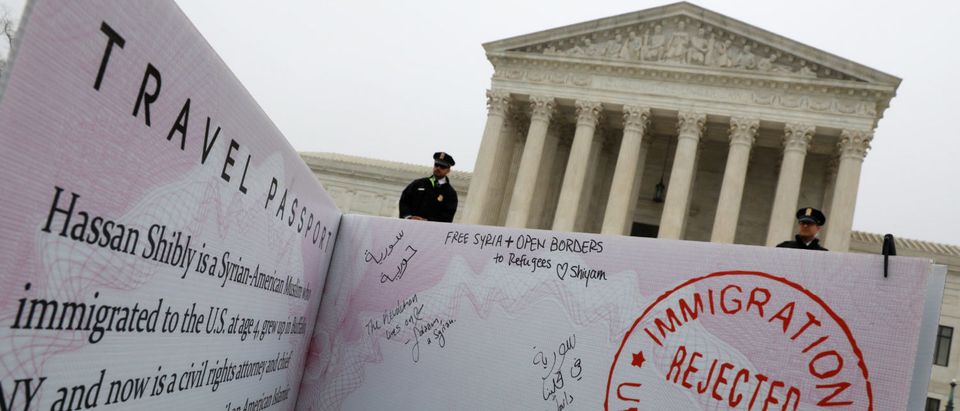The U.S. Supreme Court appeared deeply divided Wednesday over the lawfulness of President Donald Trump’s travel sanctions.
Though a tenuous majority appeared to favor the administration, the liberal bloc peppered Solicitor General Noel Francisco with brutal hypotheticals and heart-wrenching examples of migrants denied entry to the United States since Trump took office.
Justice Elena Kagan asked Francisco how thoroughly the court could review a ban on migration from Israel enacted by an openly anti-Semitic president, while Justice Ruth Bader Ginsburg wondered why a ten-year-old with cerebral palsy from a sanctioned country was denied a visa, despite exceptions proscribed for immigrants seeking medical care.
The coalition challenging the ban makes two different arguments. Their principal claim is that the sanctions exceed Trump’s authority under the Immigration and Nationality Act (INA), which prohibits discrimination on the basis of nationality in the issuance of visas. They also claim the administration’s true purpose is to disfavor Islam, in violation of the First Amendment.
In rebuttal, the administration says these proposed limitations “cannot be squared with the statutory text or historical practice [of] past presidents, and would diminish the ability of this and future presidents to use those provisions to protect the United States and conduct foreign affairs.”
The third iteration of the president’s travel sanctions were assessed against various nationals from Chad (which has since been removed from the list), Iran, Libya, North Korea, Somalia, Syria, Venezuela and Yemen. The penalties were crafted through an interagency process that sought to identify states that fail to satisfy specific security and information-sharing criteria. This broad-based review places the proclamation on surer legal ground, a point to which Francisco repeatedly returned during Wednesday’s proceedings.
Justice Anthony Kennedy, who likely holds the deciding vote, appeared to agree, noting the order at issue was more detailed than similar proclamations issued by former Presidents Jimmy Carter and Ronald Reagan. He elsewhere rejected hypotheticals proffered by Kagan and Justice Sonia Sotomayor, noting other legal avenues exist to address the abuses envisioned in their scenarios.
Still, critics charge Trump’s rationale is deceptive. A coalition of states and civil rights groups led by Hawaii say no process, no matter how exacting or prudential, could remove the taint of Trump’s purported animus for Islam, expressed on Twitter and in a handful of statements made since taking office.
“The evidence is overwhelming that EO-3 was issued for the unconstitutional purpose of excluding Muslims from the United States,” Hawaii’s brief reads. “A litany of statements by the president and his administration, stretching from the presidential campaign to the weeks after EO-3 was released, plainly announce the president’s aim of blocking Muslim entry.”
Francisco countered that the court must assume the administration is acting in good faith provided it cites a reasonable basis for its actions. In a 1972 immigration case called Kleindienst v. Mandel, the justices ruled that courts should not probe for intent when the government can produce a “facially legitimate” justification for its policies.
Kagan seized on this point, prompting her hypothetical about a ban on Israeli migrants.
“Let’s say, in some future time, a president gets elected who is a vehement anti-Semite,” she asked the SG. “And what emerges is a proclamation that says no one shall enter from Israel. Do you say Mandel puts an end to judicial review of that set of facts?”
She wryly emphasized Francisco should imagine an “out-of-the-box president,” drawing laughter from the audience in the courtroom, which included two U.S. senators, famed playwright Lin Manuel Miranda, and Karen Korematsu, the daughter of a Japanese-American whose challenge to President Franklin Roosevelt’s internment policy reached the Supreme Court in 1944.
Justice Samuel Alito was skeptical the ban betrays anti-Muslim bias. He noted just 5 of 50 Muslim-majority countries are subject to sanctions under the current proclamation, accounting for less than 10 percent of the global Islamic population.
“Would a reasonable observer think this is a Muslim ban?” he asked.
Chief Justice John Roberts wondered if the animus argument could infect other areas of government policy.
“What if military advisors tell the president that, in their judgement, [he] ought to order an airstrike against Syria,” he said. “Would you regard that as discrimination against a majority Muslim country?”
Ginsburg and Justice Stephen Breyer seemed concerned the government was not actively implementing exceptions to the sanctions, noting dozens of scholars and medically incapacitated applicants filed amicus (or “friend-of-the-court”) briefs indicating the administration was not faithfully following its own policy. The current ban exempts non-citizens seeking medical treatment, and professors or exchange students affiliated with American universities.
Though sensitive to these concerns, several conservative justices suggested Hawaii was asking the court to scrutinize the president’s national security determinations, a domain in which he has wide authority subject to limited review.
In that vein, Kagan told Neal Katyal, who represented the challengers, that it was difficult to see how the Court could produce a ruling striking down the ban that doesn’t second-guess national security findings.
“The question is how to do the kind of analysis that you want us to do without in some sense evaluating the adequacy of those national security interests,” she said.
Speaking before Wednesday’s argument, Attorney General Jeff Sessions expressed confidence the administration would prevail.
“After multiple agency heads conducted a comprehensive, worldwide review of foreign governments’ information-sharing practices and other risk factors, President Trump determined this travel order is critical to protecting the American people,” Sessions said. “We look forward to defending the order’s lawfulness today in the Supreme Court.”
Audio of the argument is available at this link. A decision is expected by late June.
Send tips to kevin@dailycallernewsfoundation.org.
All content created by the Daily Caller News Foundation, an independent and nonpartisan newswire service, is available without charge to any legitimate news publisher that can provide a large audience. All republished articles must include our logo, our reporter’s byline and their DCNF affiliation. For any questions about our guidelines or partnering with us, please contact licensing@dailycallernewsfoundation.org.












